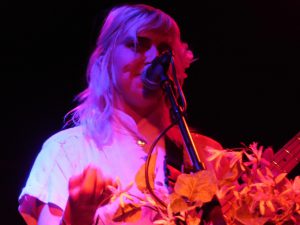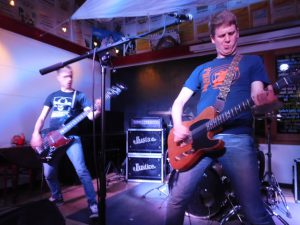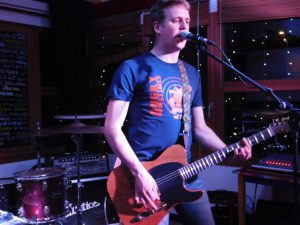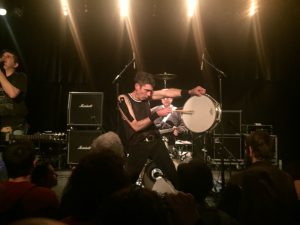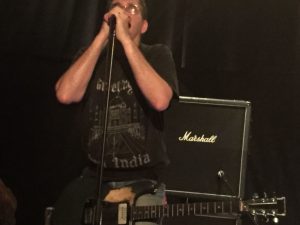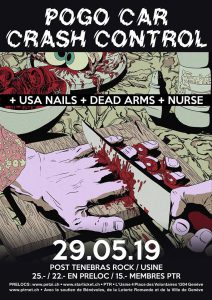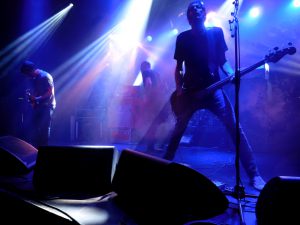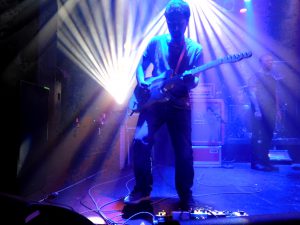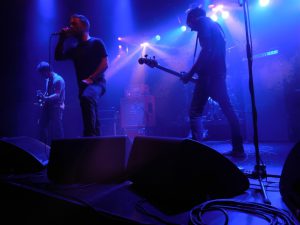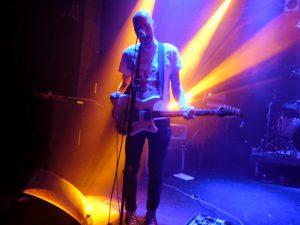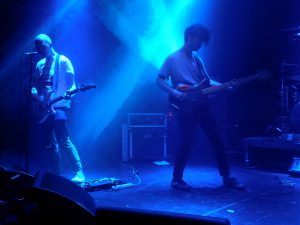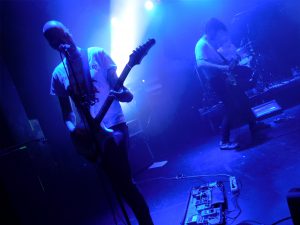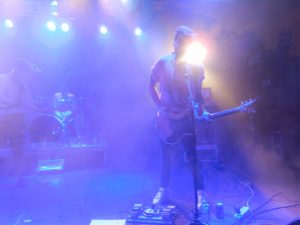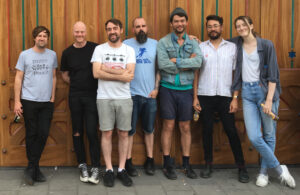
USA Nails on tour with friends Dead arms. USA Nails : Steven (left, 2nd), Tom (left, 3rd), Dan (right, 3rd), Gareth (right, 2nd) Dead arms : Alex (left, 1st), Steve (left, 4th), Dan (right, 3rd), Nic (right, 1st)
Love has only been growing for USA Nails with each album and the last one, « Life cinema », is no exception. Their own brand of virulent post-punk infused noise-rock – or whatever you feel like calling it – getting more frontal each time, more stripped to the bare essentials and yet remaining open to experimentations and a variety of atmospheres. The news that they would hit Geneva last June was therefore received with great enthusiasm and the chance to have a chat with them was seized. This interview was a particularly enjoyable moment : each member giving thoughtful answers, often building up on each other’s idea to expand their own thoughts. You could feel Dan, Steven and Gareth are pretty serious about what they are doing and make a very strong (punk) unit – Tom being a bit more on the listening side at the beginning, understandably being the latest addition to the band. Yet jokes would pop in constantly – none of the laughs mentioned in this interview are faked. Meeting USA Nails in person definitely made me want to dig dipper into their underground world and I hope this interview will make you want to do the same.
You’ve just released an album called « Life cinema », is that because you think that life is a bit of cinema ?
Steven : Yeah, it’s just about the way people present themselves, their lives and how they want to portray them. It’s very strange, but I find myself doing it as well even though I don’t want to.
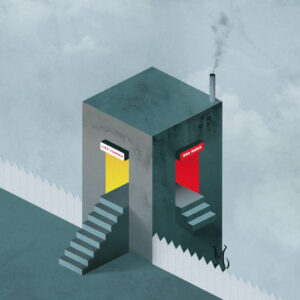
Social networks are difficult to avoid today for a band. Is that something you do with pleasure or more of a chore for you ?
Steven : We just treat it as a bit of a laugh, I guess. Instagram and stuff like that, it makes us laugh.
Dan : We never really post anything serious apart from gig information and stupid pictures.
Gareth : That’s how we want to present ourselves, as idiots ! (Everyone laughs.)
Steven : I work with children as well and now parents post pictures of them from when they are born and at every stage of their lives that are gonna be traceable when they’re old, if this technology is still there. You’ll be able to scroll back the pictures to the day you were born. Your whole life. That’s very spooky.
What makes this record special for you ?
Gareth : One of the things is that this is the first album that Tom plays drums on. All the songs we wrote with Tom so we kind of started afresh and worked out a new dynamic between the four of us. I think we ended up with a record that is maybe more melodic than the previous one, maybe there are more choruses in it – not through any conscious decision but that’s kind of what has come out of us being in a room writing music together and what has worked for us this time. I think it’s still very much USA Nails; a bit silly and a bit noisy. I feel we have honed our song writing though, I think it’s a more cohesive record and conceptually as well, I think it ties together nicely because of the things Steven said like life lived through screens and stuff like that. Yeah, I’m quite pleased with how the thing came out…
Steven : I think we got better at putting less bits in songs as well.
Dan : More space…
Steven : Yeah, starting having more of a feeling, rather than « What’s the verse ? What’s the chorus ? Oh, it needs a third section, it needs an outro. »
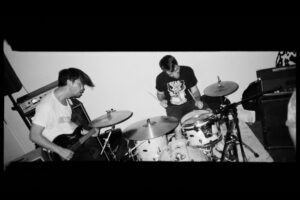
So, how would you define the perfect song ? What do you look for when you try to write a good song ?
Steven : Well, this is tricky. If I knew, I’d probably be famous ! (Laughs) Less is definitely more. We’re not trying to be virtuosic. Oh, I don’t how to articulate properly ! It has to have a certain energy.
Gareth : To be focused… I think when you are more ruthless about what you leave out, it brings the important parts of the songs more into focus, it doesn’t muddy the view of the main feel of the song. We all know when we are in a room and write together when we’ve locked in something that is pretty good. Usually some sort of melody or motif and then, well recently, we just look at developing that one thing as opposed to adding in another bit and then another bit. It’s more about just thinking about different ways of approaching this one theme.
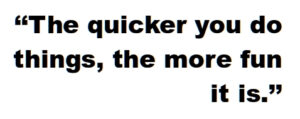
Do you consciously try to try new things ? Something very original or something that you’ve never done before ?
Gareth : Yeah, on every record, I’ve used a new tuning on my guitar because it forces me to think differently about how I approach constructing my parts – which becomes annoying when you go on tour playing songs from previous albums because you need to either work them out in the new tuning or bring two guitars as I have to do now. But it gets you out of your comfort zone, you have to think differently.
(At this point, Gareth has to concentrate on his answers : Ben, the singer of Nurse who will play first on that night is doing sound balance and his repeated desperate shouts are covering our conversation. « Is he locked outside ? », Dan comments, and everybody laughs.)
I’ve read that you were composing songs pretty quickly and pretty spontaneously, is that still the case today ?
Everybody : Yeah.
Gareth : We’ve all have experiences of being in bands where we were taking a long time to write songs but in USA Nails it has always been : trust your instincts, go with your first thing and see what happens with it – as opposed to overthinking a simple idea. Maybe it will come out crap in the end, but we can just ditch it and move on to the next thing if so.
So you can see virtues in not trying to think too much…
Gareth : Yeah, now I find it difficult to do the longer writing process. I’ve joined a new band and they write the more normal way and… sometimes it’s kind of boring. I just want to say : « No, that’s fine, that’s fine ! » It’s Steven who’s the person that really taught me to let go and stop being precious about little things. Steven will always be the first person to say : « This song is finished.That ‘s fine, we don’t need to do anymore with it. » and he’s usually right.
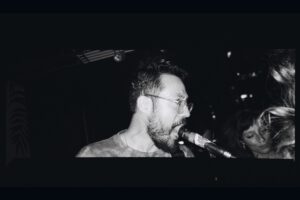
So it’s a confidence thing to be able to say « What I did is good and I don’t need to search for more » ?
Steven : It also depends on what you want to get out of it personally. In bands I’ve been in the past, we used to practice every single day and agonize over « If you’re playing this chord, I need to play a chord that isn’t a major chord it’s got to have this weird shape in it and if you’re gonna play on the beat, I’m gonna play off the beat or I’m gonna play in triplets. » Everything was agonized over, every single note. To the point where you were doing a practice where the drummer would just keep going over the same drum fill and these six hours of practising would be just trying to get the drum fill at the start of the song exactly where you want it to be and I would be just going « Blam… blam… » (Mimicking playing the same note over and over again – Ed.)… I can’t be bothered ! What’s the point ? That’s not fun ! It should be quick… and achievable. And the quicker you do things, the more fun it is, well, I find, anyway. The quicker you have something new to play, the more excited you are.
Gareth : Yeah and I guess moving quickly allows us to try new ideas. Our first songs were quite straight up but I think we quickly moved on to some weirder sort of ideas.
Dan : Our first songs sound so different. Even on our second album, there’s definitely a progression. That first album Steven just did vocals and it was just you and Stu on guitar who provided all the riffs. I guess it was naturally going to change… wasn’t it ?
Gareth : Yeah, it was written and recorded very quickly. It almost feels like it is a different band. Some people still really like that record. I do, but I think what came after is more… us.
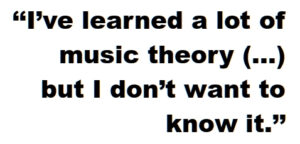
I guess what you were saying about the difficult writing process also has to do with the fact that punks often haven’t learned music formally so they’re learning how to create music in the same time that they actually create some music.
Steven : I guess it has to do with how you view yourself : as a musician or as someone using a thing with strings on to make a sound…
So how do you consider yourself ?
Steven : I’d say halfway… exactly in the middle ! (Laughs) My previous band were all highly skilled musicians. They went to music colleges and formed a band just to get big and then I joined them afterwards. I’ve learned a lot of music theory playing in that band but I don’t want to know it. (Laughs) I find it’s a hindrance. Sometimes, I’m trying to play this weird chord and then I’m like « No, just play on octave, that’s fine. »
Your guitar sound is quite distinctive, very fuzzy.
Steven : On records, it usually comes down to discussions with the guy that records – Wayne – about how it’s gonna sound. I had read interviews with the guitarist from Pissed jeans and I bought all the same equipment that he had. I liked how his guitar sounded so I bought an Epiphone Sheraton. Also it was affordable. I’m not really into expensive equipment. I own a couple of nice basses but I work for a living, I can’t afford to buy guitars all the time.
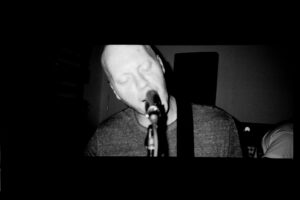
Do you think it’s possible to do something new in punk music ?
Steven : I think bands like Girl band do. I guess you take elements of other things, don’t you ? They sort of stripped the rhythm out of it, started using guitars to make noises instead of just Da-da-da-da-da (He hums some sort of nondescript chord sequence. – Ed.) and using dance beats. Yeah, I think it is possible but, I don’t know… if it’s always necessary to do something new.
Gareth : I don’t know if we do ! (Laughs)
Steven : Yeah, we don’t do anything new !
Gareth : Punk is a very broad thing, it’s hard to pin down exactly what it is anyway. Ultimately, if you’re using guitars and distortion, you’re automatically referencing decades of music before you’ve played a note. So in that respect it will always be referencing what’s been done before. So it’s hard to say what is new.
Tom : I think as synthesizers become cheaper, you see a lot more integration of that in the kind of DIY scene. Electronics across the guitars, : there’s a lot of bands that are doing that kind of things so that’s were things might go. It mixes the studio with the live performance aspect.
After all these years, records and touring, do you find that you’re getting some kind of recognition , some kind of success ?
Steven : I don’t know if that’s the name but it’s nice to see people around when you’re playing a gig. In Paris the other day, people were like falling over each other.
Dan : It’s nice to see someone you don’t know wearing your shirt, I guess.
Tom : It’s nice to see your record selling, when you had no idea if it would at all (Laughs).
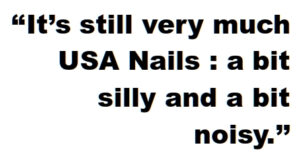
I mean there are connections between the DIY world and the bigger music world – festivals, magazines – do you often get notices or invitations ?
Steven : We don’t really get much of that.
Gareth : The label that we put the first two albums out with (Smalltown America. -Ed.) quite liked spending money on PR so we got a little bit of press but… it’s all just kind of fake, isn’t it ? It’s only because they paid for it, that’s why we got national magazines and stuff, it’s not that any of these magazines were genuinely interested in what we were doing. But for me, success is having fun and I think we are ! We get to play fun shows, we get asked to play good festivals…
Steven : We get to travel… We get to go on holidays for free, basically. We’re sat in a room, drinking booze.
Gareth : And it’s all as a result of doing something that we do for ourselves. We’re just exploring our own creative impulses, we don’t write music to enable us to sell millions of records. We write music for people like you and to enable us to visit places like this and meet people and have lots of cool experiences so, yeah… I think we’re successful !
-
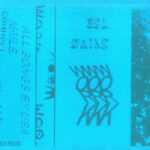
-
Tapes…
-
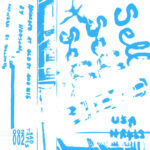
Success seems a bit of a random thing. Why is this band successful and why is this other band not ? Sometimes, it just seems there is not space for everybody.
Steven : There is a way of getting big. You have to broaden what you do…
Gareth : That word can be used in a derogatory sense, but if what you do has a broad message, a lot of people can agree with or can get on board with, then it’s gonna appeal to large groups of people…
But you wouldn’t do that consciously, trying to broaden your music and make is accessible…
Gareth : No, I’d feel a bit dirty but some bands sort of capture what’s going on at the moment. They can encapsulate something that a lot of people can relate to, some sort of fashion trends or political ideas, and they sweep everyone up with them with that.
Tom : It has to do with how much money you put in it as well.
Gareth : Oh, that helps, yeah !
Tom : I was rehearsing with what turned out to be a pop band, and the first gig was just a presentational gig, the booking agent was there, the lawyer was there. They were just getting all the people that they wanted : « Come and have a look at us and do what you want with us. » And that worked ! Now they’re getting huge. I opted out because I thought this was rubbish music but now they’re up there doing huge things.
Gareth : Do you regret that ?
Tom : I did a little bit then but I don’t now. I prefer music being a passion as opposed to doing it for the sake of launching your own career. But what I enjoy is the process. The hanging out, the rehearsing, the gigs… The process is all.
Gareth : You have to enjoy every aspect of it. If you hate rehearsals then that’s gonna come through. I enjoy every aspect of it. I love getting together in the week in a room and see what happens. It’s really exciting. I love going to the pub beforehand…
Tom : It’s more interesting when it’s something you’re passionate about. When you’re not passionate about it, it’s not about people interacting with the songs or you interacting with them, it’s more about you being the performing band to entertain them.
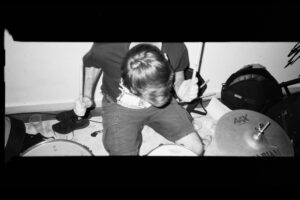
I believe you do the artwork of the band yourself…
Gareth : The album artwork was done by our old drummer, Matt. It was nice that we could get him involved even if he wasn’t going to be playing on the record. He’s done the artwork for three of the four albums. All of us sort of chip in tee-shirt designs. Danny has designed the artwork for some of the EPs, some of the tapes that we’ve done. Steven has done a bunch of tee-shirts. I tried to do a design for a tee-shirt recently but nobody was really into it. (The others are laughing their asses off. -Ed.) I don’t really have a flair for it but… thanks for trying ! That’s OK. I’ve done a couple of tee-shirts but they’ve been pretty lame.

Dan, I really like the artwork you’ve done for the tapes (Work work work and Sell sell sell on SAD Tapes. -Ed.) I wanted to ask you what or who inspired you graphically…
Dan : Me and my old drummer Matt, we clicked a lot and shared similar tastes. I like to spray a lot and screenprint at home. As for artists.. Nothing in particular. There’s this one book I have from my Mom from the seventies, just a book of illustrations. There’s no cover to it. It’s my favourite thing I own. I’m constantly looking at and drawing inspiration from that. I’m just always drawing : faces, hands and weird shapes. That’s it, really. No more to it !
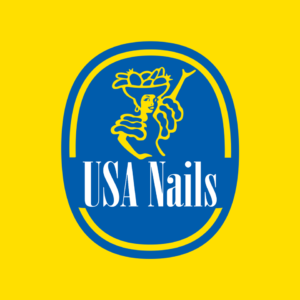
What I like is that it’s very coherent with the music…
Dan : Yeah, Steven and I started SAD Tapes – which stands for « Steven and Daniel’s Tapes » (Laughs) The idea was that Steven can record the bands and I print and create some artwork. To be fair, it’s been mainly USA Nails and Dead arms… but we’ve done Bo Gritz, which I fucked up – but they were kind enough not to complain. Steve records everything on a four-track. It’s like the love of demos, you know ? When you listen to a band’s demo and you love it, and then you listen to the same song on an album and you don’t love it cause it doesn’t have the same… urgency or whatever. I think « Sell, sell, sell » is my favourite one. There’s a lot of weird faces and strange shapes… Yeah, I think it worked quite well. Hopefully, one day we can do more. It’s not a business, it’s just another creative outlet that’s attached to the band.
Steven : Matt, our old drummer, is really into lo-fi recording and so am I. There’s often a debate as to whether we should record all our stuff like that, so we just occasionally do some lo-fi recording to scratch an itch that we have. Our albums are still recorded in a recording studio and I think it’s probably a good idea to do both. The songs (On the two tapes « Work work work » and « Sell sell sell ». -Ed.) were still written quickly.
Gareth : We knew that these songs would be recorded on four-tracks and, I don’t know about you guys but, when I was writing my parts, I was consciously thinking of the limitations or the differences in sound when recording like that.
Steven : It gives you a chance to do things that stylistically you wouldn’t normally do. There’s this song where Dan sings – he doesn’t really sing, it’s more spoken-word – it leans a bit towards the sound of The Fall, I guess.
Gareth : Yeah, more post-punky. Some people really like that.
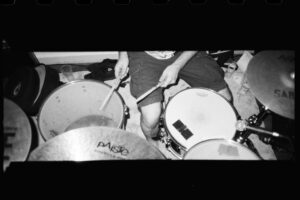
I know the « Work work work » tape is some people’s favourite recording of USA Nails.
Dan : That’s cool. We got Creative industries from this tape and we put it on the new album.
Steven : And it sounds completely different. On the tape, it sounds more like a pop song.
Dan : It was for nothing. It was just for us when we had no drummer. (« Work work work » is recorded with a drum-machine. – Ed.) Tapes are cheap to produce. So we thought let’s do a tape.
Steven : It was after our tour in America and all the bands that we played with were just selling tapes. None of them had records.
Dan : Tapes are big in the states in the DIY scene. I didn’t realize that before.
Steven : I’ve got a real love of that format. As a kid, that’s what I listened to music on. I guess people older than me listened to music on vinyl and that’s why there’s such warmth for vinyl. But me, I like tapes, I like the aesthetic, the size, the strange compressed sound. Not many people buy them I suppose, so they are more for trading.
Dan : We’re not making any money from it but it doesn’t cost the band , apart from their time.
Will you do any more in the future ? With what bands ?
Steven : Probably just us ! No, it’s tricky – well not that tricky, I just don’t like many bands.
Dan : You must make sure you get bands that are not that precious as well, that have the same sort of mentality. You’ve got to be very clear with them about what the whole thing is about. You know, we’re recording on a four-track.
Steven : It’s not going to sound like you think it’s going to sound. You have to go into it with that mindset. Everyone is in this one room playing, I can’t hear how it is going to sound. It’s not two rooms where I can go play the guitar : « Oh yeah, that’s a good sound, let’s move the mike a bit. » No, you just play, that’s it, it’s done. Don’t keep going ! (Laughs)
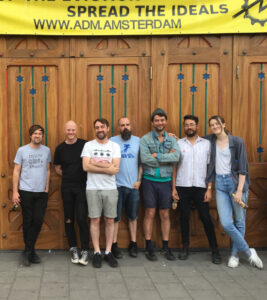
The cool live pictures have been taken by Marie Mauve Photography at the gig in Paris mentioned in the interview . Thanks a million, Marie !
There’s a video of the gig at l’Usine that’s been made, go treat yourself and watch it here.
>>>>>>>>>> USA NAILS
>>>>>>>>>> SAD TAPES
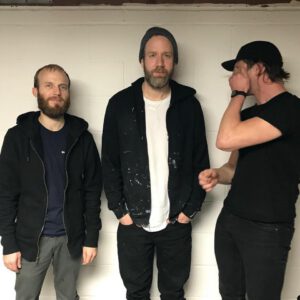
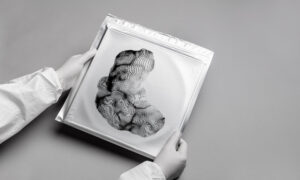
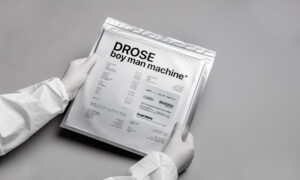


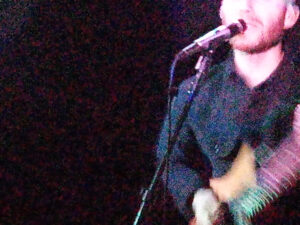
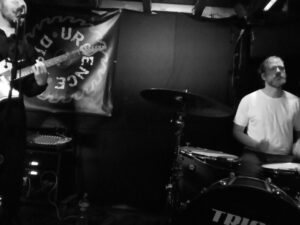
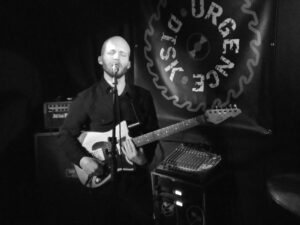
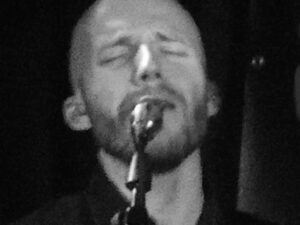
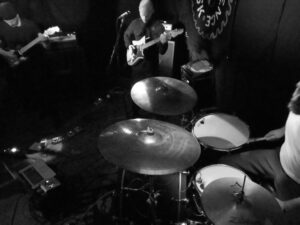

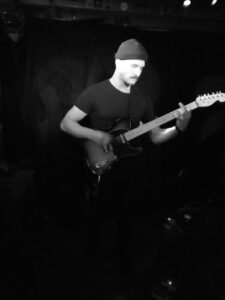
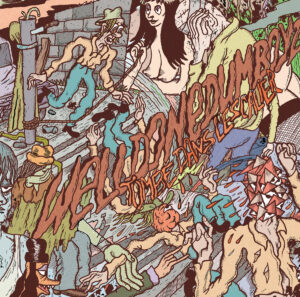
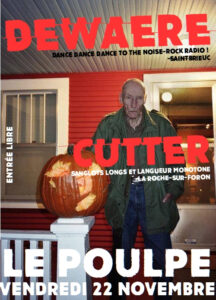
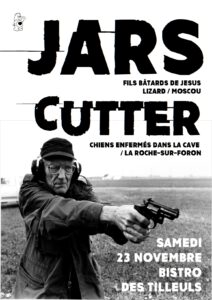

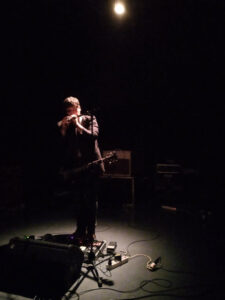
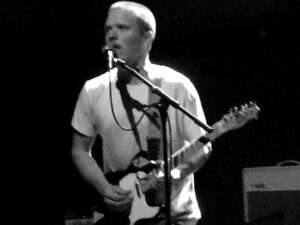
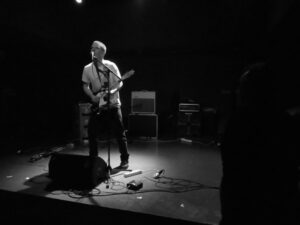
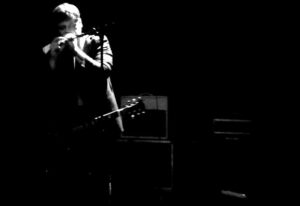
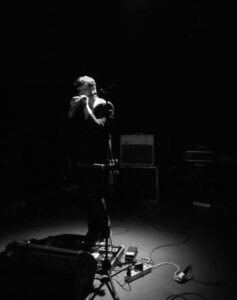
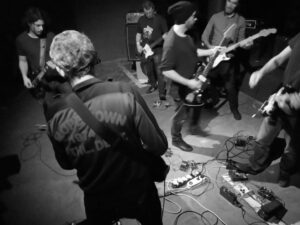
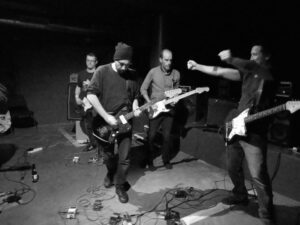
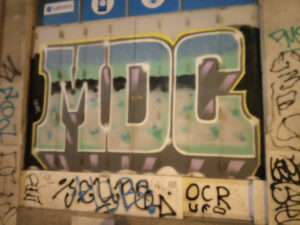
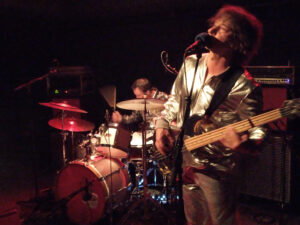
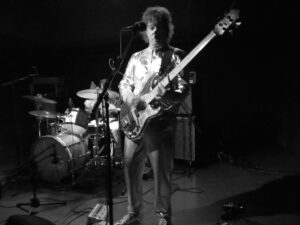
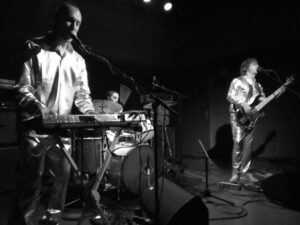















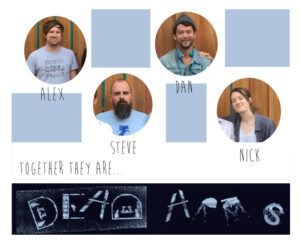
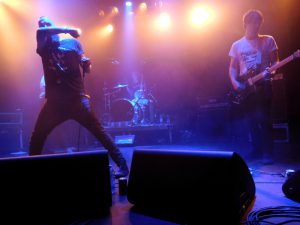
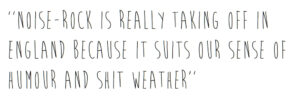
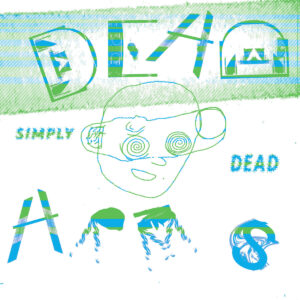

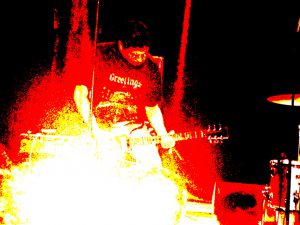
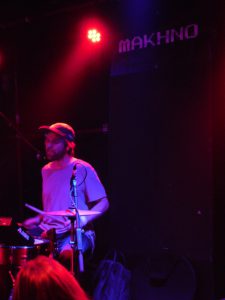
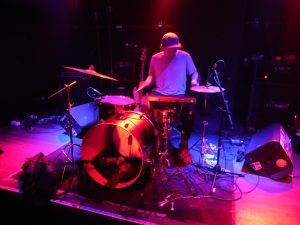 Sorte de trip-hop minimal et percussif, Sheik anorak emprunte à différents styles sans jamais y verser vraiment. Libre de ses mouvements, sans filet. Qu’il soit seul sur scène ajoute encore au côté hypnotisant de sa musique. Comme un solo de danse ou d’escalade. Assez fascinant.
Sorte de trip-hop minimal et percussif, Sheik anorak emprunte à différents styles sans jamais y verser vraiment. Libre de ses mouvements, sans filet. Qu’il soit seul sur scène ajoute encore au côté hypnotisant de sa musique. Comme un solo de danse ou d’escalade. Assez fascinant.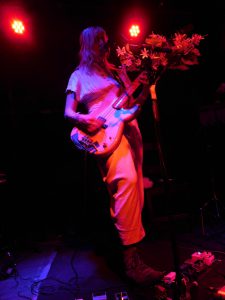 La soirée s’est poursuivie plutôt tranquillement avec le duo The Acharis et leur noisy-pop vaporeuse assortie de guitares acides.
La soirée s’est poursuivie plutôt tranquillement avec le duo The Acharis et leur noisy-pop vaporeuse assortie de guitares acides. 